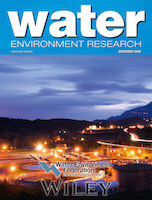
WATER ENVIRONMENT RESEARCH
Scope & Guideline
Innovating research for a cleaner, greener water environment.
Introduction
Aims and Scopes
- Water Quality Assessment and Management:
Research dedicated to developing and applying indices and models for assessing water quality in various environments, including natural water bodies and wastewater treatment systems. - Advanced Treatment Technologies:
Exploration of innovative technologies for water treatment, including electrochemical processes, microbial fuel cells, and advanced oxidation processes to enhance pollutant removal efficiency. - Microbial Ecology and Bioremediation:
Studies on microbial communities and their roles in pollutant degradation, nutrient cycling, and bioremediation strategies, emphasizing the interaction between microorganisms and pollutants. - Sustainable Water Resource Management:
Research focusing on sustainable practices in water resource management, including the reuse of treated wastewater, nutrient recovery, and strategies for minimizing environmental impact. - Impact of Anthropogenic Activities:
Investigations into how human activities, such as industrial discharges, agricultural runoff, and urbanization, affect water quality and ecosystem health. - Emerging Contaminants and Microplastics:
Focus on the occurrence, fate, and treatment of emerging contaminants, including pharmaceuticals and microplastics, addressing their environmental and health implications.
Trending and Emerging
- Integration of Machine Learning and AI:
An increasing number of studies are incorporating machine learning and artificial intelligence to enhance water quality predictions, optimize treatment processes, and improve monitoring systems. - Circular Economy Approaches:
Research focusing on the circular economy principles in water management, including resource recovery from wastewater and the reuse of materials, is gaining traction as a sustainable practice. - Advanced Materials for Water Treatment:
There is a growing interest in the development and application of advanced materials, such as nanomaterials and biochar, for more effective pollutant removal and treatment efficiency. - Climate Change Impact Assessments:
Research addressing the impacts of climate change on water resources, including changes in water quality and availability, is becoming increasingly relevant and prominent in recent publications. - Public Health and Water Quality:
Emerging studies emphasize the connection between water quality and public health, particularly regarding the presence of pathogens and antibiotic resistance in water sources. - Microbial Fuel Cells and Bioelectrochemical Systems:
There is a notable trend towards exploring microbial fuel cells and bioelectrochemical systems for wastewater treatment, highlighting their potential for energy recovery and sustainable treatment solutions.
Declining or Waning
- Traditional Chemical Treatment Methods:
There is a notable decrease in papers focusing solely on conventional chemical treatment methods, as the field shifts towards more integrated and innovative approaches that combine biological and chemical strategies. - Single-Parameter Studies:
Research focusing narrowly on single parameters (e.g., only nitrogen removal) is less common as studies increasingly adopt multi-faceted approaches that consider the interactions between various pollutants and treatment processes. - Local Case Studies without Broader Implications:
Papers that focus exclusively on localized case studies without broader applicability or implications for wider water management practices are becoming less frequent, indicating a shift towards studies with broader relevance. - Basic Water Quality Monitoring:
There is a decline in research centered on basic water quality monitoring without the integration of advanced technologies or methodologies, as the field moves towards more sophisticated monitoring techniques.
Similar Journals
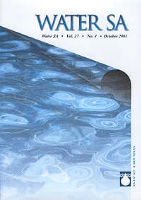
WATER SA
Fostering interdisciplinary dialogue for water solutions.WATER SA, published by the WATER RESEARCH COMMISSION, serves as a pivotal platform for interdisciplinary research in the areas of water science and technology. With an ISSN of 0378-4738 and an E-ISSN of 1816-7950, this open-access journal has been committed to disseminating knowledge since 2005, ensuring that research is freely accessible to a global audience. As of 2023, it holds a Q3 ranking in several key categories including Applied Microbiology and Biotechnology, Management, Monitoring, Policy and Law, Waste Management and Disposal, and Water Science and Technology. These rankings reflect its significant contribution to these disciplines, particularly in South Africa where it is based. With a history dating back to 1976 and converging research efforts extending through 2024, WATER SA aims to illuminate pressing water-related challenges and foster innovative solutions through rigorous scientific inquiry. Researchers, professionals, and students interested in the sustainability and management of water resources will find its comprehensive portfolio essential for advancing their work and understanding in an increasingly critical field.
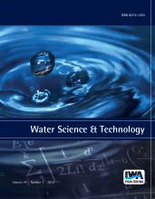
WATER SCIENCE AND TECHNOLOGY
Connecting knowledge and technology for sustainable water practices.WATER SCIENCE AND TECHNOLOGY, published by IWA PUBLISHING, is a leading academic journal dedicated to advancing the field of water science and technology. With a rich history dating back to 1970, the journal provides a platform for innovative research and technological advancements, catering to the vital challenges faced within the realms of environmental engineering and water resource management. As evidenced by its strong ranking in Scopus, where it holds a position of #86 in Water Science and Technology and #77 in Environmental Engineering, the journal exemplifies significant scholarly contributions, reflected in its Q2 quartile status in both categories as of 2023. Although not an open access journal, WATER SCIENCE AND TECHNOLOGY ensures that its articles are widely available to researchers, professionals, and students passionate about sustainable water solutions. With a continued commitment to excellence, this journal plays a crucial role in shaping the discourse surrounding water quality, conservation, and technology innovation, making it an essential resource for all stakeholders in this critical field.

Water Reuse
Advancing Knowledge for a Thirsty Planet.Water Reuse is a pioneering journal dedicated to advancing the field of water science and technology, particularly focusing on innovations in water recycling and reuse strategies. Published by IWA Publishing in the United Kingdom, this journal has quickly established itself as a vital resource for researchers, professionals, and students engaged in sustainable water management practices. With an impressive impact factor and a ranking that places it in the top quartile for both Water Science and Technology and Filtration and Separation, Water Reuse offers an open-access platform that fosters the dissemination of high-quality research. Since its inception in 2021, it has garnered attention for its commitment to addressing critical global challenges related to water scarcity and environmental sustainability. The journal provides a crucial forum for the exchange of knowledge and best practices, contributing significantly to the advancement of water reuse methodologies. By encouraging interdisciplinary collaboration and the publication of pioneering studies, Water Reuse is poised to play a central role in shaping the future of water management.
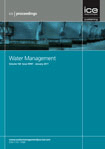
PROCEEDINGS OF THE INSTITUTION OF CIVIL ENGINEERS-WATER MANAGEMENT
Driving Change in Water Management through Scholarly ExcellencePROCEEDINGS OF THE INSTITUTION OF CIVIL ENGINEERS-WATER MANAGEMENT is a prestigious journal published by Emerald Group Publishing Ltd, dedicated to advancing the field of water management within civil engineering. With an ISSN of 1741-7589 and an E-ISSN of 1751-7729, this journal delivers peer-reviewed research that spans the critical intersections of water science and technology, contributing valuable insights into sustainable water management practices. As evidenced by its ranking in the 2023 Scopus categories, where it holds the Q3 quartile in Water Science and Technology, and a respectable position among its peers, the journal remains a vital resource for researchers, professionals, and students in the field. Though it is not an open-access journal, it offers accessible subscription options that facilitate worldwide dissemination of knowledge, enhancing its role as a fundamental reference point for cutting-edge developments in water management. For those looking to publish or stay updated on the latest research trends, this journal serves as an essential platform for promoting innovation and sustainable practices in civil engineering and water resources management.

Water Practice and Technology
Connecting Research and Practice in Water TechnologyWater Practice and Technology is a distinguished open-access journal published by IWA PUBLISHING, dedicated to disseminating cutting-edge research and practical insights within the field of water science and technology. With an E-ISSN of 1751-231X, the journal has been at the forefront of sharing knowledge since its inception in 2011 and has transitioned to open access in 2021, providing unrestricted access to high-quality research articles. Based in the United Kingdom, this journal plays a vital role in advancing the understanding of water resource management, treatment technologies, and environmental sustainability. As of 2023, it is categorized in the Q3 quartile for Water Science and Technology with a Scopus rank of #157/261, placing it in the 40th percentile among its peers. Researchers, professionals, and students alike will find the journal a valuable resource for the latest trends, innovations, and practical applications in the water sector, facilitating a collaborative approach towards addressing global water challenges.

Journal AWWA
Delivering Peer-Reviewed Insights for a Cleaner, Safer Water World.Journal AWWA, published by WILEY, serves as a vital platform in the fields of Chemistry and Water Science and Technology. Established in 1946 and with a rich history extending to 2024, this journal is dedicated to the dissemination of innovative research and practical insights that address the pressing challenges associated with water quality and management. Although currently not an open-access publication, it provides important contributions to a diverse audience, including researchers, industry professionals, and students dedicated to advancing knowledge in water sciences. With a respectable Q3 ranking in both the Chemistry and Water Science categories, as well as competitive Scopus rankings, Journal AWWA consistently delivers peer-reviewed articles that foster critical discussions and promote sustainable solutions within the community. The journal's commitment to excellence ensures that it remains a significant resource for those engaged in environmental science and technology.

Water Research X
Shaping the future of water resources through cutting-edge research.Water Research X is a prestigious journal published by ELSEVIER, focusing on the dynamic fields of water science and technology, pollution, ecological modeling, and waste management. Since its inception in 2018, this Open Access journal has become a cornerstone resource for researchers and professionals dedicated to advancing our understanding and management of water resources. Based in the United Kingdom, Water Research X holds an impressive ranking within the Scopus metrics, positioned in the Q1 category across multiple relevant disciplines, including Environmental Science, with a notable rank of 10/261 in Water Science and Technology and 3/41 in Ecological Modeling. This reflects its commitment to disseminating high-quality research that informs policy, supports sustainable practices, and fosters innovation in water management.

Water Resources
Pioneering interdisciplinary research for water resilience.Water Resources, a prominent journal published by MAIK NAUKA/INTERPERIODICA/SPRINGER, focuses on the critical and evolving field of water science and technology. Established in 1976 and with a long-standing commitment to advancing knowledge, this journal explores interdisciplinary research that addresses the challenges surrounding water resource management, quality, and sustainability. With an impact factor positioned within the Q3 category of its field, it holds a notable Scopus rank (#181/261) in Environmental Science, emphasizing its role in driving scholarly discourse. While currently not open access, Water Resources provides vital insights for researchers, professionals, and students, making it an essential resource for those seeking to innovate and implement effective water management solutions. To stay ahead in a domain that is increasingly paramount to global sustainability efforts, consider engaging with the latest research published in this vital journal.
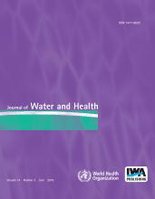
JOURNAL OF WATER AND HEALTH
Pioneering research for a healthier world through better water management.The JOURNAL OF WATER AND HEALTH, published by IWA PUBLISHING, serves as a leading platform for disseminating innovative research related to water quality, sanitation, and public health. With its ISSN 1477-8920 and E-ISSN 1996-7829, this esteemed journal significantly contributes to the fields of Public Health, Environmental Science, and Microbiology, as evidenced by its robust rankings in several quartiles, including Q2 in Public Health and Water Science and Technology in 2023. This periodical enjoys a convergence of years from 2003 to 2024, underscoring its continuous relevance in addressing critical global issues such as water safety and infectious diseases. Although not an open-access journal, the insights and findings presented are pivotal for researchers, professionals, and students eager to contribute to the sustainable management of water resources and health improvements worldwide.
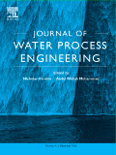
Journal of Water Process Engineering
Shaping Tomorrow’s Water Technologies TodayJournal of Water Process Engineering, published by Elsevier, stands as a leading authority in the interdisciplinary fields of Biotechnology, Process Chemistry and Technology, and Water Science and Technology. With its ISSN 2214-7144, this journal has established itself since its inception in 2014, reaching its convergence year in 2024. Renowned for its high-impact contributions, it holds a prestigious Q1 ranking in 2023 across multiple categories, including Safety, Risk, Reliability and Quality and Waste Management and Disposal. The journal aims to advance knowledge and practice in water processing, addressing global challenges related to water scarcity, environmental safety, and sustainable technology. While the journal does not currently offer open access options, it remains a vital resource for researchers, professionals, and students dedicated to advancing water process engineering and management practices. By disseminating innovative research and methodologies, the Journal of Water Process Engineering plays a crucial role in shaping future technologies and strategies essential for water sustainability.